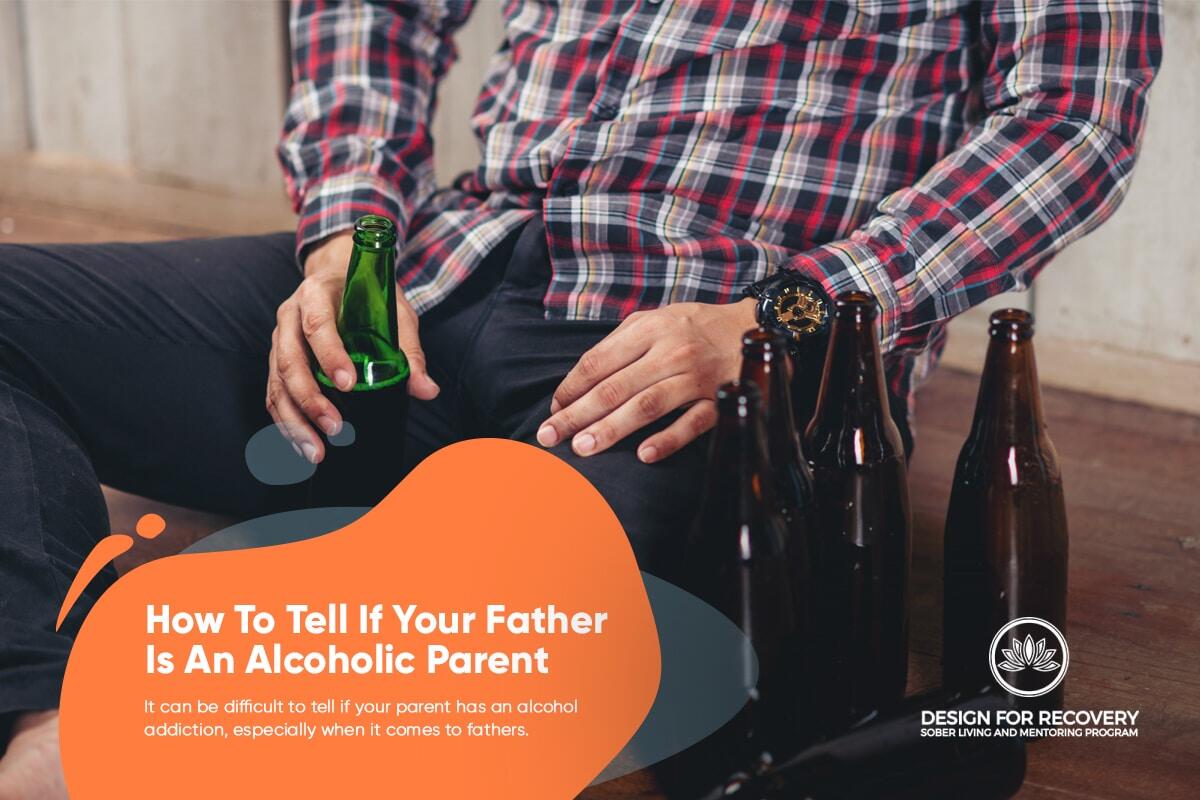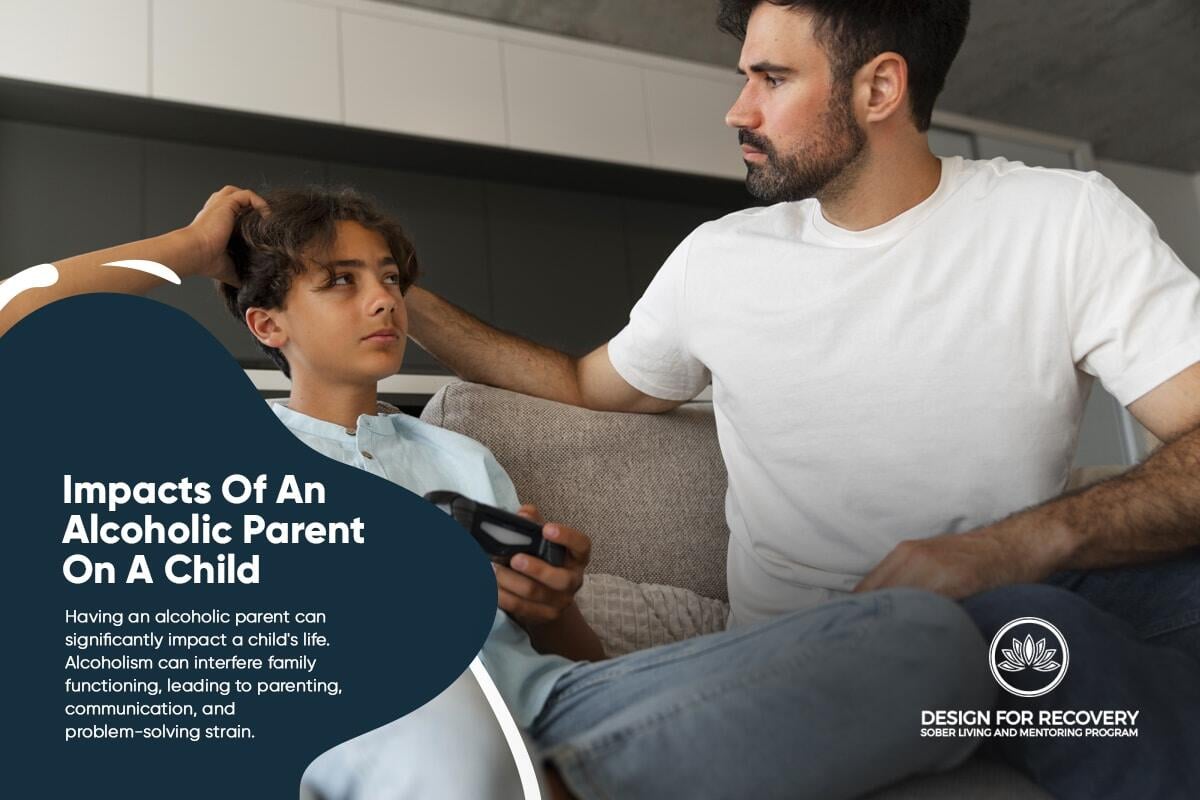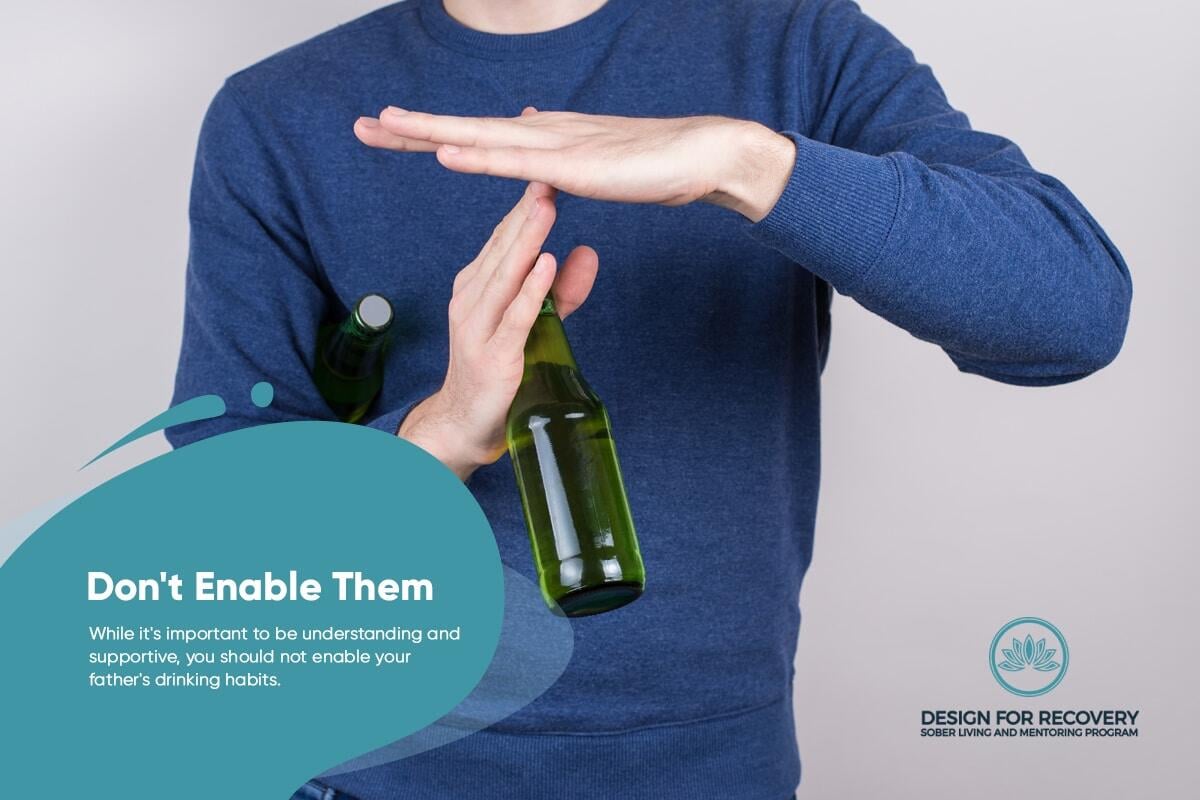It can be challenging to cope with having an alcoholic father. The worry, guilt, and fear of this situation can lead to various emotions, such as anger, sadness, frustration, and resentment. You may even feel embarrassed or ashamed that your father is struggling with addiction.
Despite the challenges, there are ways you can learn to better cope with this situation. Knowing how to manage with an alcoholic father and the support and resources available is important.
Understanding Alcoholism
It’s important to understand what the signs and symptoms of alcohol abuse are to better comprehend the situation you are dealing with. Alcoholism, also known as alcohol use disorder (AUD), is a condition of addiction characterized by the inability to stop drinking or limit drinking. People with AUD will continue to drink even if it’s causing harm to themselves or those around them. Alcoholism can cause physical and psychological problems and financial and social difficulties
How To Tell If Your Father Is An Alcoholic Parent

It can be difficult to tell if your parent has an alcohol addiction, especially when it comes to fathers. Alcoholism can manifest in different forms and may not always be obvious. It’s important to recognize the signs indicating a drinking problem to get help for yourself and your family.
Signs of an alcoholic father include:
Drinking more frequently
If your dad drinks daily or consumes multiple drinks at once, this could indicate an alcohol problem.Drinking in excess
If you notice that your father often drinks to the point where he has trouble functioning or becomes overly intoxicated, this is another red flag.Becoming defensive about drinking
If your father becomes aggressive when questioned about his alcohol consumption or tries to hide the amount of alcohol he consumes, this could be a sign of a problem with alcoholism.Becoming reckless or irresponsible
If you notice that your father’s behavior changes after drinking, and he begins to act in ways that are dangerous or out of character, this could be a sign of an alcohol problem.Experiencing changes in health
If your father experiences physical problems or has a worsened mental state related to his drinking, this could indicate he may have an issue with alcohol.
If you think your father may have an issue with alcoholism or substance abuse, it’s important to talk to him and express your concerns in a nonjudgmental manner. It’s also important to know the resources available to help those struggling with an alcohol problem, such as support groups, therapy sessions, and addiction treatment programs.
Can I Stop My Alcoholic Dad From Drinking?
As a child of an alcoholic parent, you may feel compelled to help your father stop drinking, but remember, you can’t force change. Approach him gently, express concerns, and set boundaries. You can’t control his actions, but your honest conversation may prompt him to seek help.
Impacts Of An Alcoholic Parent On A Child

Alcohol addiction in fathers can harm kids’ mental and physical health, causing sadness, anxiety, and behavioral problems. This impact can extend into adulthood, affecting self-esteem and relationships. They may also struggle with behavioral issues such as social withdrawal & violent behavior.
Alcoholism can interfere with family functioning, leading to parenting, communication, and problem-solving strain. Children of alcoholics tend to suffer from anxiety and depression more than other children. They may also struggle with school or work due to emotional issues related to living with an alcoholic parent.
Adult children of alcoholics may also develop difficulties in forming relationships. They may be more likely to become dependent on others or repeat patterns from their parents, such as being overly controlling, demanding, and manipulative. Children of alcoholics are also more likely to use drugs or alcohol themselves to cope with the trauma they have experienced.
These children need to know they are not alone. It can be helpful to talk with a counselor or therapist who can provide support and resources to help them heal from the trauma of having an alcoholic parent and seek treatment. You can even find a support group for the children of alcoholics, which can be beneficial in providing understanding and empathy from people who have experienced similar challenges. However, studies show that family therapy sessions and AL-Anon family groups are great ways to help bother the person drinking and those affected by the drug abuse.
Reaching out for help is important in healing and can provide much-needed support. It’s also important to remember that no matter what has happened, it was not your fault, and you are worthy of love and acceptance. With the right resources, children of alcoholics can lead healthy, fulfilling lives.
Call Design for Recovery to Begin Your Healing Journey!
Reach out to our team to discuss sober living options and next steps toward a healthier routine.
Advice For Young Kids With Alcohol Parents

Many young kids these days are sadly struggling with the effects of having an alcoholic parent. It can be a difficult and confusing situation to be in, and those kids need to find guidance from someone they trust.
Children must understand that their parent’s behavior is not their fault. They did nothing wrong; the parent must seek help to change their behavior. It can also be helpful for kids to talk with another adult, such as a teacher or coach, about the situation at home. These adults must be aware of the challenges they are facing so they can provide additional support and understanding when needed.
Kids also need to find healthy outlets for their emotions. Sports, art, music, and other activities can be great self-expression and stress relief forms. Participating in group therapy or individual counseling sessions with a mental health professional who can provide support and guidance to help deal with difficult situations is also beneficial. If the issues aren’t addressed, these children grow to develop behavioral disorders.
Advice For Young Adults With Alcoholic Parents
Having an alcoholic parent can be particularly difficult for young adults, who may feel overwhelmed with the responsibility and guilt of caring for their parents. However, it’s important to remember that you are not alone in your struggles.
Talking about your experiences openly and honestly with someone you trust and who will provide unconditional support is important. This could be a counselor, therapist, or a close friend willing to listen. It’s also important to recognize when it becomes too much and take care of yourself first, as caring for your parent should not come at the expense of your mental and physical well-being. Some children develop PTSD and other mental health issues due to the consequences of their parent’s alcohol abuse.
It’s okay to set boundaries and limits when caring for your parent. It’s important to remember that you don’t have to “fix” their drinking problem; eventually, they must do this themselves. You can show them love and support but also be firm in what you are able and willing to do for them.
Finally, it’s important to recognize that your parent’s alcohol problem does not reflect who you are. You can still live a happy, fulfilling life despite your circumstances. Don’t be afraid to seek help and care for yourself when needed.
How To Deal With An Alcoholic Father
When it comes to dealing with an alcoholic father, it can be difficult and emotionally draining. It’s important to remember that your father’s alcoholism is not your fault and that you cannot control his drinking habits or their consequences. But, there are measures you can take to cope with this challenging situation.
1. Don’t Blame Yourself
It’s important not to blame yourself for your father’s alcoholism. Alcoholism is a mental health issue, not caused by anything you have done or said. Your father has chosen to turn to alcohol to cope with his problems, and you should never feel guilty for this. Instead, try to focus on supporting yourself and your well-being.
2. Don’t Enable Them

While it’s important to be understanding and supportive, you should not enable your father’s drinking habits. You should not condone or encourage their behavior or buy them alcohol. As difficult as this may be, it’s important to help them recognize their problem and offer support while encouraging them to seek professional help.
Contact Design for Recovery Today!
Fill out our quick form to connect with a peer mentor and learn how our sober living community supports accountability, structure, and personal growth in recovery.
3. Avoid Arguing When Intoxicated
When your father is intoxicated, it can be difficult not to argue with them. It’s important to recognize that the person in front of you is not the same as your sober father and try to remain calm during these episodes. Remember that alcohol harms judgment and reasoning, so trying to reason with an intoxicated individual will not be effective.
4. Take Care Of Yourself First
When dealing with an alcoholic father, it’s important to remember that your well-being should be your top priority. Taking the time to focus on self-care and doing activities such as exercising and meditating can help you stay grounded and focused. Talking to a therapist or attending support groups may also be beneficial in helping you cope with the situation.
5. Seek Professional Help For Them

If your father is struggling with alcoholism, it’s important to seek professional help. Offer to go with them to therapy or an Alcoholics Anonymous meeting if you can, and make sure they know all the resources available to help them recover from alcoholism.
6. Consider Rehab
In some cases, rehabilitation may be the best option for your father’s recovery. Explore facilities and programs to help them break their addiction and establish healthier habits.
7. Set Boundaries
You must set boundaries and stick to them. Ensure your father knows what behavior is and isn’t acceptable, and be firm in enforcing these boundaries. This may mean having hard conversations or spending less time with them if they don’t abide by the rules that you have set.
Treatments For Alcoholism
Alcoholism is treatable, but managing the condition requires ongoing effort and dedication. It’s important to note that there are no simple cures for alcoholism, and recovery can be lifelong.
Treatment may involve professional counseling, medication, and lifestyle changes such as joining support groups or participating in therapy sessions with healthcare professionals. Licensed therapists can help provide essential support and guidance to those in recovery. The best way is to choose for one-on-one mentoring to help with a parent’s alcoholism.
It’s also important for family members of alcoholics to seek help and support as they work through the challenges of living with an alcoholic father or other loved one. Family therapy can be beneficial in helping families develop healthy coping mechanism, understand the effects of alcoholism on individuals and relationships, learn communication skills, and rebuild trust within the family.
Finding the right type of treatment for an alcoholic father is a challenging process, but there are resources available to help individuals and families manage alcoholism. Help is available through alcohol rehabilitation centers, mental health clinics, support groups, and other organizations that specialize in addiction recovery.
Find Effective Alcohol Rehabilitation Near You
The journey to recovery is never easy, and it may take many years of dedication and effort, but individuals and families can cope with the effects of alcoholism. With the right treatment plan, support network, and dedication to recovery, an alcoholic father can manage his condition and live a healthier life.
At Design for Recovery, we take care of finding effective alcohol rehabilitation programs near you. Our knowledgeable and experienced team will help you find the right treatment program that meets your needs while providing professional support.
If you are seeking help for an alcoholic father or family member, contact us today at 310-554-6862 to begin your personalized journey toward recovery.
- Understanding Alcoholism
- How To Tell If Your Father Is An Alcoholic Parent
- Can I Stop My Alcoholic Dad From Drinking?
- Impacts Of An Alcoholic Parent On A Child
- Advice For Young Kids With Alcohol Parents
- Advice For Young Adults With Alcoholic Parents
- How To Deal With An Alcoholic Father
- 1. Don’t Blame Yourself
- 2. Don’t Enable Them
- 3. Avoid Arguing When Intoxicated
- 4. Take Care Of Yourself First
- 5. Seek Professional Help For Them
- 6. Consider Rehab
- 7. Set Boundaries
- Treatments For Alcoholism
- Find Effective Alcohol Rehabilitation Near You
Begin Lasting Sobriety Now!
Frequently Asked Questions
An alcoholic father is a parent who has been diagnosed with an alcohol use disorder, meaning they have become physically and psychologically dependent on alcohol. Alcoholism can cause significant harm to the person suffering from it and those around them, including their children.
Growing up with an alcoholic parent can have long-lasting effects on a child. It can lead to low self-esteem, emotional insecurity, and difficulty forming relationships. Children may also experience feelings of guilt or shame when it comes to their parent’s drinking habits. The financial strain caused by alcoholism can also harm a child’s educational opportunities and overall stability.
The first step in helping your child is to provide them with support and understanding. Let your child know they are not responsible for their father’s drinking habits and that it isn’t their fault. Encourage open communication about their feelings and provide them a safe place to express their emotions. It may also be beneficial for your child to seek outside help from a therapist or counselor who can help them deal with their issues.
There are numerous resources available to children of alcoholic fathers. Many organizations offer support groups specifically for children of alcoholics, where they can connect with other children in similar situations. A wealth of online information and resources is also available to learn more about the issue and helpful tips and advice on coping.
Yes, medically assisted treatment can be an effective way to treat alcoholism. Medically assisted treatments generally involve a combination of medications and behavioral therapy, which can help reduce cravings for alcohol and manage withdrawal symptoms. Additionally, long-term support programs such as Alcoholics Anonymous (AA) can provide ongoing emotional support, helping individuals maintain sobriety in the future.
It’s important to remember that recovery from alcoholism is a long process, and it may take time for your child’s father to make meaningful progress. Continue showing your child unconditional love and support while encouraging them to practice self-care. You may also want to look into support programs or other resources that can help your child cope with the situation. Your child and their father can overcome this difficult time with patience and understanding.
- Simons, J. S., Carey, K. B., & Wills, T. A. (2009). Alcohol abuse and dependence symptoms: a multidimensional model of common and specific etiology. Psychology of addictive behaviors : journal of the Society of Psychologists in Addictive Behaviors, 23(3), 415–427. https://doi.org/10.1037/a0016003
- Raitasalo, K., Holmila, M., Jääskeläinen, M., & Santalahti, P. (2019). The effect of the severity of parental alcohol abuse on mental and behavioural disorders in children. European child & adolescent psychiatry, 28(7), 913–922. https://doi.org/10.1007/s00787-018-1253-6
- Wlodarczyk, O., Schwarze, M., Rumpf, H. J., Metzner, F., & Pawils, S. (2017). Protective mental health factors in children of parents with alcohol and drug use disorders: A systematic review. PloS one, 12(6), e0179140. https://doi.org/10.1371/journal.pone.0179140
- Wackernah, R. C., Minnick, M. J., & Clapp, P. (2014). Alcohol use disorder: pathophysiology, effects, and pharmacologic options for treatment. Substance abuse and rehabilitation, 5, 1–12. https://doi.org/10.2147/SAR.S37907
- Adkison, S. E., Grohman, K., Colder, C. R., Leonard, K., Orrange-Torchia, T., Peterson, E., & Eiden, R. D. (2013). Impact of fathers’ alcohol problems on the development of effortful control in early adolescence. Journal of studies on alcohol and drugs, 74(5), 674–683. https://doi.org/10.15288/jsad.2013.74.674
- Timko, C., Cronkite, R., Kaskutas, L. A., Laudet, A., Roth, J., & Moos, R. H. (2013). Al-Anon family groups: newcomers and members. Journal of studies on alcohol and drugs, 74(6), 965–976. https://doi.org/10.15288/jsad.2013.74.965







Written By
David Beasley